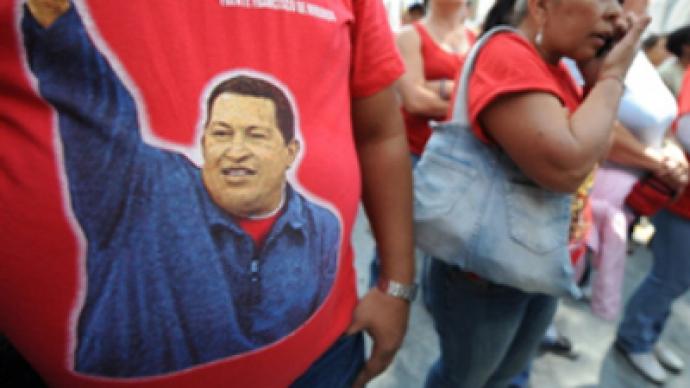Chávez revolution forced towards U-turn?

While Venezuela’s revolution is still fired up with rhetoric, the oil price slump may extinguish its potency. Will pragmatism require Chávez to temper his domestic, economic and foreign ambitions?
Last month, Venezuelans voted to remove the constitutional term limits of their ambitious president. Hugo Chávez wants another 10 years to cement ‘Venezuela’s socialist revolution’.
The pro-constitution amendment campaign harnessed the full support of the state and government-owned media. It reaped a winning 55% ‘yes’ vote, while the disorganised opposition was only 9 points behind, narrowing the 25 point gap from the 2006 presidential election.
Proclaiming the government’s accomplishments of economic reform, social welfare and the prospect of land reform, Chávez now claims a further popular mandate. However, opposition is growing and away from his bedrock of support among the poor, the country is divided.
Chávez has little sympathy for opposition figures. His supporters, backed by the police, have been squatting at the Caracas city hall preventing the mayor from access. The former paratrooper rails against opposition media, begging the public for support in his fight with them.
Socialist policies in action
During his 10 years in power, resources have been poured into healthcare, education and job training for Venezuela’s poorest. Social welfare programmes have sought to set in place fundamental rights such as retirement pensions, vacations and pre- and post-natal leave.
The funds for these expensive policies have come from record oil prices and a nationalisation programme. Meanwhile, foreign investment has collapsed and established foreign companies are nervous. On March 1, the army was sent in to expropriate a US-owned rice mill. The government uses muscular intervention to pursue its control of the economy.
Chávez’s government sets prices in strategic sectors, such as oil, milk and rice. The controls were designed to fight inflation – the continent’s highest at 31% – instead, they have created food shortages especially in staple products.
Record oil prices enriched the OPEC-member, but the present slump puts long-term social programmes at risk. To the annoyance of the USA, one of his biggest clients, Chávez has used his oil politically, exporting it cheaply to Cuba in 1999 and Iran in 2007.
Leaving ‘the devil’ behind
Chávez’s relationship with the US features colourful rhetoric, calling President Bush ‘the devil’ and the incumbent as having the ‘same stench’. Last September, Venezuela threw out the US ambassador, the US reciprocating by expelling his Venezuelan counterpart.
President Obama’s administration has said it seeks a ‘positive relationship’ with Venezuela. However, bridge-building has been put back by last week’s US State Department report on human rights. It highlighted the harassment of the opposition and media, as well as government corruption.
In response, Venezuela’s Foreign Ministry said the US had ‘the darkest record of violations of human dignity in contemporary history’.
US authorities also recently criticised Venezuela’s war on drugs. In response, Venezuela’s Attorney General Luisa Ortega Diaz requested a mission to perform ‘a review in the US to see if it is fully complying with efforts to prevent drug use’.
Mixed messages over terrorist links
Relations with neighbouring Colombia have been limited by long-held suspicions that Venezuela harbours Farc guerillas. A controversial Colombian military incursion into Ecuador against Farc in 2008 found evidence of co-operation.
Colombia claimed a computer disc discovered in the Farc base was owned by the guerrillas’ second-in-command and foreign minister Raúl Reyes and laid out the high-level contacts between the terrorists and the Chávez government.
The Venezuelan government claimed the information was faked. Since then, Chávez has called on Farc to lay down its weapons.
Leading the Bolivarian revolution
While the 54-year-old claims his inspiration is 19th-century South American liberator Simón Bolívar, critics compare his brand of socialism to Cuban communism.
Chávez has attempted to establish a form of Latin American unity, which can stand apart from the US. He founded the Bolivarian Alternative for the Americas trading bloc with Bolivia, Cuba, Dominica, Honduras and Nicaragua to further this aim.
Venezuela has become a standard bearer for countries seeking a counterweight to the US ‘empire’, which Chávez blames for backing the short coup in 2002. Despite his fiery rhetoric, economic reality may require Chávez to change the direction of his revolution. He has also said: “Any day is propitious for talking with President Barack Obama.”
Jonathan Stibbs for RT













